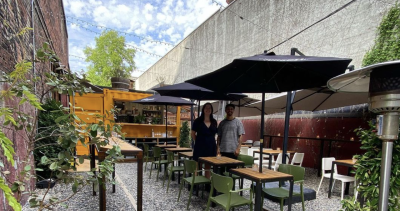Classism pervades debates around cannabis and 4/20 Vancouver—but we rarely talk about that in Canada
As I watch some work themselves into a lather over the 4/20 event at Sunset Beach, it reminds me of the great class divide that still exists over cannabis.
The rich, who often vote NPA in Vancouver, can drink their Scotch at a multitude of outlets, including the finest restaurants and private clubs in the city.
The upper middle class can sip on a craft beer in B.C. government-approved liquor "gardens" at parks, beaches, and other festival venues across Vancouver.
But if the masses, including many poor people, want to descend upon a public beach to celebrate cannabis once a year even after organizers were refused an opportunity to apply for a licence, there will be hell to pay in the media.
And this "riff-raff" can expect to be trashed over Twitter, which is the preferred social-media tool of the elites.
Last September, Vancouver cannabis historian Jamie Shaw explained how the history of cannabis has been intertwined with colonialism, repression, and racism for hundreds of years.
In her presentation at SFU Harbour Centre, she also talked about how the war on cannabis in the 20th century helped authorities scapegoat those seeking equal rights, including African Americans, hippies, Jews, and Latin Americans.
In addition, Shaw cited numerous examples to support her argument that the war on cannabis—and on poor people—has occurred not just in North America, but also in India, China, and Latin America. It's global.
Drawing on the lessons of history, Shaw declared: “The end of prohibition isn’t a win. It’s a draw. And it’s a war that’s still going on.”
If it weren't for the large turnouts at Vancouver's annual 4/20 celebration, it's questionable whether the Liberal Party of Canada would have ever promised to legalize weed before the 2015 election.
Even then, this government's deregulation is a far cry from equality.
More than six months after cannabis was legalized in Canada, there are only three small legal non-medicinal pot shops in Vancouver—a city with a population of more than 600,000. It's a joke.
Provincial governments have maintained a monopoly over the wholesale business. It's being supplied by large licensed producers whose shareholders are making a killing on the stock markets.
Cartels—whether they're in the oil, cannabis, or any other industry—like to stifle competition to preserve their profits.
As a result, consumers pay higher prices. The little guys can't get into the game. The rich get richer and the poor just have to suck it up.
No doubt, this will be one of the long-term outcomes of the Liberal government's cannabis legalization—and it's one reason why the country needs events like 4/20 to drive that point home.
Hoi polloi's tastes don't conform
Canadian legalization is just the latest iteration in the class war that has characterized cannabis for centuries.
As an Atlantic staff writer, Conor Friedersdorf, pointed out in a 2012 essay, the poor have suffered disproportionately through cannabis prohibition in a multitude of ways.
This includes violence linked to the black market, the vast majority of which occurred in poorer neighbourhoods and poorer countries.
He noted that poor people were arrested more frequently than those in the upper middle class, and were more likely to be convicted and to face harsher penalties.
And Friedersdorf emphasized that kids from poor families had a much greater economic incentive to become dealers than those from wealthy families.
But they've largely been dealt out by Canada's legalization.
The kids from wealthy families attend the best business schools, which are churning out graduates who sometimes work for publicly traded licensed producers.
Just attend any cannabis festival, including the one at Sunset Beach, and you'll realize instantly that you're not in the presence of Scotch swillers who spend their downtime at the Terminal City Club or the Vancouver Club.
It's the hoi polloi who attend 4/20.
If you parse their words, here's what some of the festival's critics are really saying:
1. How dare these people come into the increasingly gentrified West End and fill the air with the smell of filthy cannabis?
2. How dare they ignore our brahmins who sit around the table at the park board office—and the overpaid mandarins who advise them—and show up on a public beach without a permit to listen to some music?
3. How dare they question the legitimacy of the park board itself, which was created by the elites to ensure that the Indigenous history of the region was erased?
4. How dare they claim that 4/20 is a protest when we've already legalized cannabis?
As Harvard psychology professor Steven Pinker wrote in The Blank Slate: The Modern Denial of Human Nature: "Much of what is today called 'social criticism' consists of members of the upper classes denouncing the tastes of the lower classes (bawdy entertainment, fast food, plentiful consumer goods) while considering themselves egalitarians."
Pinker could just as easily have been referring to the hullabaloo in Vancouver over 4/20.















Comments